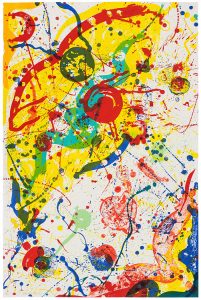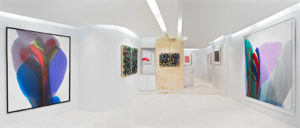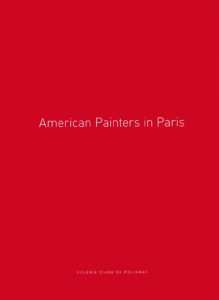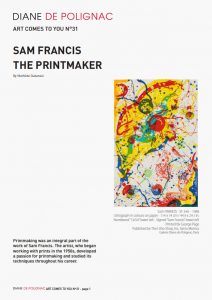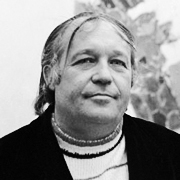
(1923-1994)
Sam Francis is a key artist of American Abstract Expressionism. A cosmopolitan and a great interpreter of colour, his work was influenced by French Post-Impressionism as well as American and Asian contemporary art. He was associated with the Color Field, Tachisme and Action Painting movements.
Exhibitions
Publications
AMERICAN PAINTERS IN PARIS
Published by the Galerie Diane de Polignac
Exhibition Catalog
French / English – 40 pages
Artwork Analysis
The Revelation of painting for Sam Francis
Sam Francis (Samuel Lewis Francis) was born on June 25th, 1923 in San Mateo, California. His parents were teachers. His mother, Katherine Lewis Francis, who had passed on to him a love of music, died prematurely in 1935. Sam Francis went to Berkeley University in California in 1941 to study botany, medicine and psychology. Sam Francis interrupted his studies to join the US Air Corps in 1943. The following year, while he was in the reserves, Sam Francis was the victim of an accident during training. His plane crashed and he suffered a serious spine injury. Sam Francis spent several years bedridden in hospital.
Partly paralysed, able to move only his head and arms, Sam Francis began to paint with watercolour to combat boredom and depression. He painted what he saw, mainly the sky and changes in the light. David Park, a teacher at the California School of Fine Arts, visited Sam Francis and brought him art from a local private collection: works by Miró, Klee, and Picasso among others. Sam Francis developed a love for painting that never left him: “I painted to stay alive”. In 1946, he finished his convalescence at his father’s home and married Vera Miller, a childhood friend.
Sam Francis returned to Berkley in 1948 and attended painting classes given by Clyfford Still. He painted landscapes and more abstract works in a Post-Surrealist manner. Sam Francis graduated with a degree in art in 1950. Although some of his University professors advocated purely American art, Sam Francis was fascinated from early on by Europe. Painters originally from Europe such as Willem de Kooning (Dutch), Mark Rothko (Latvian) and Hans Hofmann (German) were already famous in the USA. Sam Francis was also sensitive to Robert Motherwell’s tributes to French culture, and Franz Kline’s respect for English culture. His professor Erle Loran’s classes on the French painter, Paul Cézanne also encouraged Sam Francis to choose France. In 1950, Sam Francis divorced Vera Miller. That year, funding from a fellowship allowed him to move to Paris with Muriel Goodwin . They were married from 1955 to 1958.
Sam Francis’s Years in Paris
In Paris, Sam Francis pursued his education in the studio of Fernand Léger. He also discovered Impressionist and Post-Impressionist artists that left a lasting impression: Claude Monet, Pierre Bonnard, Henri Matisse and Paul Sérusier. Sam Francis met members of the Parisian art world: the art critics Georges and Claude Duthuit, Michel Tapié and the artists Al Held, Norman Bluhm, Joan Mitchell, and Jean-Paul Riopelle. These influences, and Sam Francis’s interest in the depiction of light and the sky, led him to experiment with an informal form of abstraction.
Sam Francis’s first solo exhibition was in 1952 at the Galerie Nina Dausset, rue du Dragon in Paris. Sam Francis exhibited in a museum for the first time three years later, at the Bern Kunsthalle, Switzerland. In 1956, a few of his works were included in the exhibition Twelve Artists at MoMA in New York. Success thus arrived immediately – and it was international. Time Magazine referred to him as “the hottest American painter in Paris these days”. He was compared to New York artists: Jackson Pollock and Mark Rothko: The art critic Herbert Read however placed him separately and wrote in 1957 that Sam Francis: “ Must not be confused with those ‘action painters’ who hope to achieve greatness by riding their brushes as if they were witches’ brooms. He is on the contrary a very deliberate, a highly conscious and conscientious painter”. Until 1961, the painter Sam Francis lived in France, going back and forth between Paris and the South.
Sam Francis in Japan
Sam Francis also travelled a lot: around Europe, the USA, to Mexico and to Japan. In 1957, while he was in Japan, Sam Francis first began to experiment with the white space that would become more and more important in his paintings. It was also there that he met the artist Teruko Yokoi who became his third wife; they had a daughter: Kayo. Sam Francis became familiar with Eastern philosophies, especially Buddhism which was especially important to his work.
Sam Francis’s Monumental Works
Sam Francis stood out for his skill with large format paintings. His first were three large paintings on canvas of about 380 x 600 cm each for the Basel Kunsthalle made between 1956 and 1958. These paintings, inspired by Monet’s Waterlilies that he had seen at the Musée de l’Orangerie, were dispersed in 1965. He gave one of them to the Pasadena Art Museum, a second is in the collections of the Stedelijk Museum of Amsterdam.
In 1959, Sam Francis made a monumental painting for the Chase Manhattan Bank of New York, measuring approximately 25 x 11.5 m. He then worked from 1967 to 1969 on the painting Berlin Red (7.3 x 11 m) commissioned by the Neue Nationalgalerie of Berlin. It is composed of bright multi-coloured marks placed close to the edges of the canvas.
In 1983, Sam Francis moved to a large studio in San Leandro in California which gave him the space to paint monumental works, such as for the international airport and for the Wattis Institute for Contemporary Arts of San Francisco. In 1985, Sam Francis also painted a triptych for the ceiling of the entrance hall of the Théâtre Royal de la Monnaie in Brussels. For the painter Sam Francis, the size of his monumental works corresponded to the creation of an immersive environment for the viewer.
The Artist Sam Francis Achieves International Recognition
In 1958, the art critic Michel Tapié wrote in Gutaï, the Japanese avant-garde art magazine, that “art cannot be considered on a scale other than global”. This phrase corresponds perfectly to Sam Francis’s career. In fact, a press release from the previous year by Martha Jackson defined Sam Francis as as the “first truly international American painter.”
Between 1960 and 1963, he painted his series of Blue Balls, characterized by biomorphic shapes and projections that are in mostly blue, laid out on the surface of the canvas. The series is his way of expressing the pain he suffered from renal tuberculosis. This disease forced him to be hospitalized again in Bern in 1961.
Sam Francis then settled in Santa Monica, California where his paintings took on very strong colours. His works were shown at Post Painterly Abstraction in 1964 at the Los Angeles County Museum of Art and the same year at Documenta in Kassel. In 1966, Sam Francis married Mako Idemitsu with whom he had two sons, Osamu and Shingo.
Colours became progressively less strong in the works of the 1970s. Sam Francis painted his series of Grids: paintings structured with dark coloured grids. Between 1973 and 1974, Sam Francis lived mostly in Tokyo where he exhibited twice, at the Idemitsu Art Museum and the Minami Gallery.
International exhibitions followed in succession: at the Museum of Fine Arts Houston in 1967, at the National Centre for Contemporary art of the Rothschild Foundation in Paris in 1968, at the Whitney Museum of American Art of New York in 1972, at the Boston Institute of Contemporary Art in 1979 and the Toyama Museum of Modern Art in 1988.
In 1975, Peter Selz’s monographic book Sam Francis was published. In 1980, Sam Francis was appointed to the Committee for the Los Angeles Museum of Contemporary Art and the following year the French culture minister made him a Commander of the Order of Arts and Letters. Sam Francis married his final wife, the artist Margaret Smith in 1985: they had a son, Auguste, the following year.
The Artist Sam Francis: Other Passions
In 1970, Sam Francis opened The Litho Shop in Santa Monica: a studio which produced his prints in limited editions. The catalogue raisonné of his prints, written by Connie Lembark was published by Hudson Hills Press in 1992. Sam Francis also set up the publisher Lapis Press to produce artists’ books.
Sam Francis was also interested in other areas: technology, psychology, medicine, botany, the environment…. So he invested in research. In 1975, he created a company that produced wind energy. In 1987, he created the Sam Francis Medical Research Center to finance research on infectious diseases and HIV.
During the final year of his life, Sam Francis, who was suffering from cancer, could no longer use his right hand. He thus painted a series of 150 small works with his left hand. He died on November 4th, 1994 at Santa Monica in California.
© Diane de Polignac Gallery
Translation: Jane Mac Avock
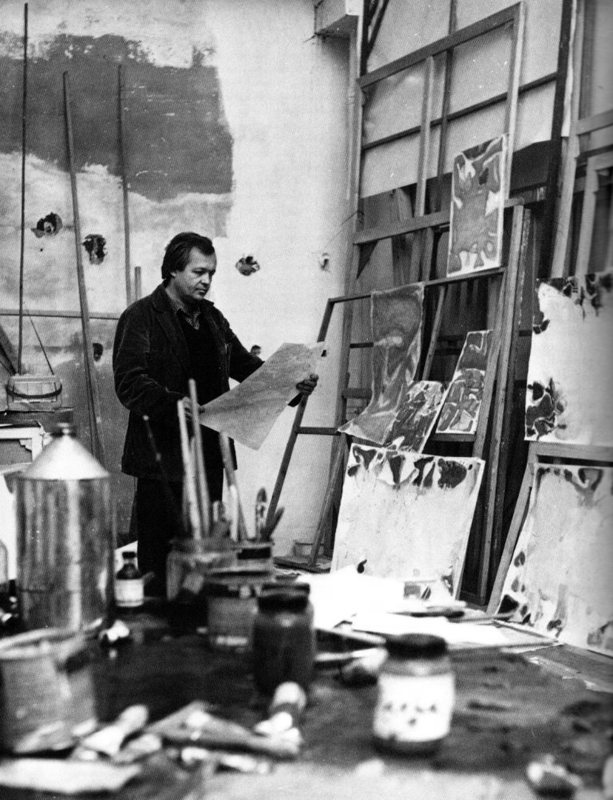
Selected Collections
Selected Collections
Amsterdam, Museum van der Togt
Amsterdam, Stedelijk Museum
Basel, Fondation Beyeler
Basel, Kunstmuseum
Baltimore, Baltimore Museum of Art
Berkeley, University of California
Bratislava, Danubiana – Meulensteen Art Museum
Buffalo, Albright-Knox Art Gallery
Cambridge, Fogg Art Museum, Harvard Art Museums
Chicago, Art Institute of Chicago
Cologne, Ludwig Museum
Dallas, Museum of Fine Arts
Düsseldorf, Kunstsammlung Nordrhein-Westfalen
Essen, Folkwang Museum
Hamburg, Kunsthalle
Hanover, Kunstmuseum
Hawaii, Honolulu Museum
Houston, The Menil Foundation
Humlebaek, Louisiana Museum of Modern Art
Idemitsu, Museum of Arts
Jerusalem, Israel Museum
Kurashiki, Ohara Museum of the Arts
London, The Tate Gallery
London, Victoria and Albert Museum
Los Angeles, Los Angeles County Museum of Art
Los Angeles, Museum of Contemporary Art
Milwaukee, Milwaukee Art Museum
Montreal, Museum of Fine Arts
Munich, ACA Gallery
Naoshima, Benesse House Museum
New Haven, Yale University Art Gallery
New York, The Metropolitan Museum of Art
New York, MoMA
New York, Solomon R. Guggenheim Museum
New York, Whitney Museum of American Art
Paris, Centre Pompidou – Musée National d’Art Moderne
Paris, Musée d’Art Moderne de Paris
Pasadena, Norton Simon Museum
Philadelphia, Philadelphia Museum of Art
Pittsburgh, The Carnegie Institute
Rome, Galleria Nazionale d’Arte Moderna
San Francisco, Fine Arts Museum of San Francisco
San Marino, The Huntington Library, Art Collections, and Botanical Gardens
Seattle, Seattle Art Museum
Seoul, Museum of Modern Art
Shiga, Museum of Modern Art
Silkeborg, Museum Jorn
Stockholm, Moderna Museet
Stuttgart, Staatsgalerie
Tokyo, National Museum of Western Art
Toronto, Art Gallery of Ontario
Toulouse, Les Abattoirs – Art Moderne et Contemporain
Toyama, Museum of Modern Art
Vienna, Essl Museum
Washington, D.C, Joseph H. Hirshhorn Museum
Washington, D.C, National Gallery of Art
Washington, D.C, Smithsonian Institution of American Art Museum
Selected Exhibitions
Selected Exhibitions
Galerie Nina Dausset, Paris, 1952
Galerie Rive Droite, Paris, 1955, 1956, 1960
Martha Jackson Gallery, New York, 1956, 1958, 1963, 1970
Zoé Duzanne Gallery, Seattle, 1956, 1957
Galerie Ad Libitum, Antwerp, 1956
Gimpel Fils, London, 1957
Galerie Alfred Schmela, Dusseldorf, 1958, 1961
MoMA, New York, 1958
Galerie Klipsein & Kornfeld, Bern, 1959, 1961
San Francisco Museum of Art, San Francisco, 1959, 1967
Pasadena Art Museum, Pasadena, 1959
Seattle Art Museum, Seattle, 1959
Kunsthalle, Bern, 1960
Galerie de Seine, Paris, 1960
Galleria La Notizie, Turin, 1960
David Anderson Gallery, New York, 1960
Gres Gallery, Chicago, 1961
Galleria II Segno, Rome, 1961
Minami Gallery, Tokyo, 1961, 1964, 1974
Galerie Jacques Dubourg, Paris, 1961
Graphisches Kabinett Weber, Düsseldorf, 1961
Galerie Nachts St. Stephan, Vienna, 1961, 1962
Grabowski Gallery, London, 1961
Galerie D. Benador, Geneva, 1962
Galerie Edwin Engelberts, Geneva, 1962
Bezaliel National Art Museum, Jerusalem, 1962
Esther Bear Gallery, Santa Barbara, 1962
Galerie Pauli, Lausanne, 1962
Kestner Gesellschaft, Hanover, 1963
Wurttembergischer Kunstverein, Baden-Baden, 1965
The Museum of Fine Arts, Houston, 1967
Kunsthalle, Basel, 1968
Centre National d’Art Contemporain, Paris, 1968
Albright Knox Art Gallery, Buffalo & New York, 1972
Idemitsu Art Museum, Tokyo, 1974
Fundacion Eugenio Mendoza, Caracas, 1974
American Center, Nagoya, 1974
Modern Art Gallery, Basel, 1974
The Phillips Collection, Washington, 1974, 1980
Galerie Kornfeld, Zurich, 1977
Galerie Pudelko, Bonn, 1977
Maxwell Davidson Gallery, New York, 1979
Institute of Contemporary Art of Boston, 1979
Foster Goldstrom Fine Arts Inc., Boston, 1979
Robert Elkon Gallery, New York, 1979, 1984
Asher & Faure Gallery, Los Angeles, 1980
Los Angeles County Museum of Art, Los Angeles, 1980
André Emmerich Gallery, New York, 1981, 1982, 1986, 1997
Ace Gallery, Los Angeles, 1981
Galerie Richard Gray, Chicago, 1982
Nantenshi Gallery, Tokyo, 1982, 1985, 1987
Studio Marconi, Milan, 1983
Fondation Maeght, Saint-Paul de Vence, 1983
Studio Marconi, Milan, 1983
Galerie Jean Fournier, Paris, 1983, 1985, 1988, 1995, 1999, 2010
Knoedler Gallery, London, 1984
Galerie Kornfeld, Bern, 1985
Galerie Richard Gray, Chicago, 1985
Manny Silverman Gallery, Los Angeles, 1987
Smith-Anderson Gallery, Palo Alto, 1988
Bernard Jacobson Gallery, London, 1988
Museum of Modern Art, Toyama, 1988
Gallery Ikeda-Bijutsu, Tokyo, 1989
Knoedler Gallery, London, 1989
Angles Gallery, Santa Monica, 1991
Gagosian Gallery, New York, 1991
Jan van der Togt Museum, Amstelveen, 1994, 2014, 2017
Louisiana Museum of Modern Art, Humlebaeck, 1995
Galerie Nationale du Jeu de Paume, Paris, 1995
Delaive Gallery, Amsterdam, 1996, 1997, 1998, 2003, 2009, 2010, 2012, 2016, 2018
Galerie Michael Haas, Berlin, 1996
Thomas Segal Gallery, Baltimore, 1998
Fundació Joan Miró, Barcelona, 1998
Galerie Guy Pieters, Knokke & Saint Paul-de-Vence, 1998, 2003, 2014
Galleria Il Gabbiano, Rome, 1998
Leslie Sacks Fine Art, Los Angeles, 1999, 2009, 2014
Musée d’Art et d’Histoire, Fribourg, 2003
Helly Nahmad Gallery, New York, 2010
Galerie Thomas Moderne, Munich, 2010
Page Gallery, Seoul, 2010
Martin Lawrence Galleries, New York, 2012
Museum of Art, Santa Barbara, 2012
Fondation Beijeler, Basel, 2013
Galerie Malingue, Paris, 2013
Galleria d’Arte Maggiore, Bologna, 2013
Jonathan Novak Contemporary Art, Los Angeles, 2014, 2019
Galerie Iris Wazzau, Davos, 2014, 2016
Galerie Fleury, Paris, 2014
Galerie Diane Polignac, Paris, 2015
Centre Pompidou, Paris, 2015
Norton Simon Museum, Passadena, 2016
The University of British Columbia, Vancouver, 2016
Opera Gallery, Zurich, 2017
Seizon Museum of Modern Art, Nagano, 2018
Centre Pompidou, Metz, 2018
Heather James Fine Art, Palm Desert, 2019
Selected Bibliography
Selected Bibliography
Yves Michaud, Sam Francis, Paris, Daniel Papierski, 1992
Alain Biancheri, Les Arts plastiques au XXe siècle, Paris, Édition Z, 1993
Lydia Harambourg, L’Ecole De Paris, 1945-1965 : Dictionnaire Des Peintres, Lausanne, Ides et Calendes, 1993
Sam Francis: Les Années Parisiennes 1950-1961, catalogue of the exhibition at the Galerie Nationale du Jeu de Paume (December 1995-February 1996), Paris, Édition du Jeu de Paume, 1995
Éric de Chassey, La Peinture efficace: une Histoire de l’abstraction aux États-Unis (1910-1960), Paris, Éditions Gallimard, 2001
Lydia Harambourg, L’École de Paris, 1945-1965, Dictionnaire des peintres, Ides et Calendes, Neuchâtel, 1993, (update by Clotilde Scordia, Ides et Calendes, Neuchâtel, 2010)
Debra Burchett-Lere, Sam Francis – Catalogue Raisonne of Canvas and Panel Paintings, 1946-1994, Berkeley, University of California Press, 2011
Debra Burchett-Lere and Peter Selz, Sam Francis, five decades of abstract expressionism from California collections, New York, Sam Francis Foundation, 2013
John Yau, Sam Francis, London, Bernard Jacobson Ltd, 2014
